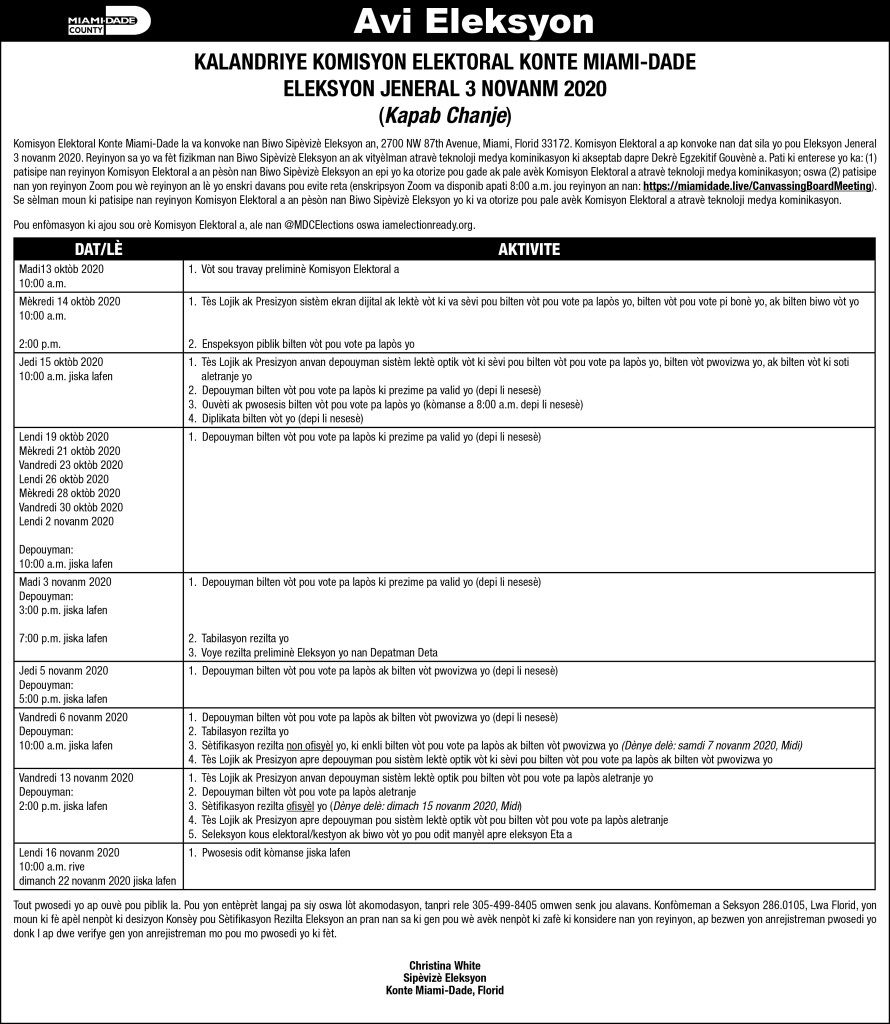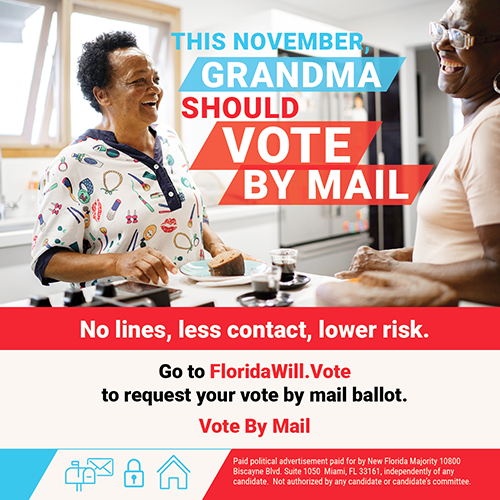BY Sandy Dorsainvil, Chairwoman, HAPC,
Dr. Marie O. Etienne, Chair of Public Relations of HAPC
Why is it important to vote and be counted in the election process?
The upcoming 2020 election is very critical as we are living in unprecedented and uncertain times, not only for the Haitian Community, but the entire world. This is one reason why it is essential for us to come together as a community to forge alliances to promote voter and civic engagement. As a community, we need to exercise our freedom to fully participate in the election process. We have the power to influence government policy, and hold governmental officials accountable for their actions or lack thereof. Our community relies on the media as its source of information; therefore, we need to ensure that funds are available for the media to educate the community, be independent of government influence, and be provided equal access to information. The Haitian American Professionals Coalition (HAPC) promotes community connectedness to build trust, empathy, collaboration and support to address the multitude of issues affecting the Haitian Community.
Fundamentally, when it comes to presidential elections, many decide that their vote doesn’t matter, but in fact, their vote matters. It will make a difference, because your vote along with other voters in your district will matter when it comes to electoral results. Your vote counts!
How engaged are you in your community? Why is it so hard to grasp the idea that it takes all of us to generate positive energy and not assign any blame to anyone, rather take action and do something different that can benefit the community as a whole. Here are some ways we can be more civically engaged in the community: You can serve on an organization board, such as your local School Board or the Parent Teacher Association (PTA), or be a member of a local charity. Perhaps you read the local paper or quarterly newsletters from our municipality and vote at election time. We can certainly understand between work, family, and other commitments, it can be hard to find time to pay attention and get involved, but civic engagement is an essential part of exercising your rights in our society. Do not allow the barriers or challenges stop you from being involved in the community.

Here are some tips to how to best get engaged in the election process:
– If you are a citizen,18 years old or older, you can register to vote.
– Request for a mail-in-ballot and do early voting.
– Stay connected and volunteer with a political candidate of your choice by working on their campaign. You can assist with door-to-door outreach, phone banks, letter writing campaigns, postcards, etc.
– Find out if there is a campaign office or headquarter, and volunteer even if you are not a U.S. Citizen.
– Go out and serve as a translator, talk with the Haitian Community.
– Donate money or raise funds for your candidate of choice.
– Use the power of social media such as Facebook, WhatsApp, Instagram, Twitter, and other public forums to share the reasons why it is necessary to get out the vote.

2020 is the year of major elections and the year where a global pandemic has forced us to reexamine our role as civically engaged citizens and stakeholders. As Haitian Americans particularly for those of us living in South Florida, our history in this community has taught us deeply important lessons about representation. We quickly understood that in spite of our ability to take it to the streets, our voices would not be heard without the power of our votes.
Our transformation as marginalized non-voters to the second largest immigrant group and a significant voting block has not gone unnoticed. It is clear that we vote, many of us are considered super voters. But is the simple act of voting enough? Does our community’s ability to tip the scale in major elections enough?
As we assess the needs in our community and the issues continue to impede financial mobility, educational achievement and representation, it is clear that voting is not enough. Our votes will only make an impact in our community, if they are carefully associated with commitments to an agenda which will help our community advance. Our vote, our act of civic engagement, must not be exercised in vain. It must be used to reward or make an example of those who will not support our vision for a healthier, a wealthier and better educated community.
COVID-19 has shaken us to our core, it has forced us to reconfigure our priorities and define what is critically important to us as a community. We know from the pandemic that our community has been disproportionately impacted by the virus because of underlying conditions such as high blood pressure, diabetes, asthma and cancer. These pre-existing conditions are exacerbated by the limited access to health care. Improving access to affordable health care is critical.
Our community has experienced great difficulty in accessing the resources available to those affected by the pandemic because they cannot use the most digital applications most commonly used to access jobs, education and telehealth services. Bridging the digital divide is critically important to ensure our community’s successful navigation of resources in this post-COVID-19 “new normal”.
Economic Empowerment and building the capacity of our small businesses and entrepreneurs is also critical. Many of our small businesses lacked the wherewithal to access the pandemic relief programs available. Their weaknesses revealed the major fault lines in our economic landscape. We need to prioritize them, invest in their education and their growth. HAPC has worked with a broad coalition of community stakeholders to create a community agenda which reflects our issues and priorities. We will continue to share major elements of our agenda and hope that this platform will give us the opportunity to further expand and refine our document.

2020 represents the 50-year mark of our significant presence in this community. We arrived as immigrants fighting for the right to remain in this country and today, we have emerged as a major voting block. In this critical year of the pandemic, let’s not make our vote meaningful! It’s not too late to register to vote. It’s not too late to register to vote by mail. It’s not too late to be informed about the issues! Let’s do it! Pa kite Two ta bare nou!
For more information about voter registration: 1-866-687-8683
To register for vote by mail: Floridawill.vote
But what does civic engagement mean?
“Civic engagement means working to make a difference in the civic life of our communities and developing the combination of knowledge, skills, values and motivation to make that difference. It means promoting the quality of life in a community, through both political and non-political processes….
A morally and civically responsible individual recognizes himself or herself as a member of a larger social fabric and therefore considers social problems to be at least partly his or her own; such an individual is willing to see the moral and civic dimensions of issues, to make and justify informed moral and civic judgments, and to take action when appropriate.”
About The Haitian American Professionals Coalition (HAPC
The Haitian American Professionals Coalition (HAPC) is a 501(c)3 nonprofit organization which was established in 2001. HAPC is comprised of a core assembly of volunteer professional associations, organizations and individuals, business leaders, media and community members that seek to advocate and promote the well-being of Haitian communities in Florida, United States and abroad. Our mission is to mobilize and link professionals of diverse occupations in order to effectively address issues relevant to the community and to provide opportunities for growth and development.
HAPC Core Member Associations include:
Haitian Lawyers Association (HLA) – Haitian American Nurses Association of Florida (HANA) – Haitian American Chamber of Commerce of Florida (HACCOF) – Caribbean American Visual Cultural Preservation (CAVCP) – Community Access Center (CAC) – Association of Haitian Educators of Dade (AHED)- Family Action Network Movement (FANM).
